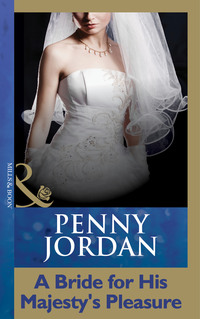
Полная версия
Power Play
Elizabeth in turn had invited him to Boston. Her parents had been impressed with him. Her father was a partner in the family bank, and it hadn’t taken Henry Calvert very long to discover that Simon Herries came from a family that was almost as clever and conservative with money as his own.
The wedding had made headlines in all the Society papers—discreet ones, of course; after all, there was Royalty present. Simon’s godmother was a Royal, and she had graciously consented to attend.
Of course the ceremony had had to take place at St Margaret’s, Westminster. Mrs Calvert had been torn between elation and disappointment. It would have been very pleasant indeed to have hosted a dinner in Boston for her future son-in-law’s godmother, but Simon had been adamant: the ceremony was to take place at St Margaret’s.
There was a piece in The Times lauding the new legislation he was pressing for to tighten up the laws regarding child abuse. He was building up a reputation for being a fierce campaigner for law and order and a return to a more strict moral climate. He was known among his peers, sometimes acidly, as the “Housewives’ Choice.” He smiled as he re-read the piece. There were an awful lot of housewives, and all of them had the right to vote.
His assistant would no doubt cut the piece out for him and clip it to his PR file. She was a twenty-three-year-old Cambridge Honours graduate, and Simon had been sleeping with her for the past three months. She was intelligent, but a little too intense. His mind shifted gear. It was probably just as well that the long vacation was coming up; it would help cool things down a little. He had no intention of getting too heavily involved.
Simon opened the envelope, slitting it carefully with a silver-handled knife, which had been given to his grandfather by the monarch.
The letter was brief and uninformative. It simply invited him to present himself at the offices of Minesse at three on Monday afternoon, to discuss something of mutual benefit.
It wasn’t such an unusual letter; and he checked in his diary to see if he had the afternoon free. He had, and he pencilled in the appointment and a note to ask his secretary to produce everything she could on Minesse and its founder Pepper Minesse. He had never met her, but she had the reputation of being a beautiful and very clever woman.
Miles French, barrister at law, and quite possibly soon to be Judge French, didn’t receive his letter until Monday morning.
He had spent his weekend with his latest lover. He was a man who liked to concentrate on one thing at a time, and when he was with a woman whose company he enjoyed, he didn’t like anything else to distract him. He and Rosemary Bennett had been lovers for almost six months, which was quite a long time as far as he was concerned. He liked beautiful women, but he also liked intelligent conversation, and his mind frequently grew bored before his body.
Rosemary was an editor on Vogue, and occasionally if she felt he was stepping out of line, she liked to punish him by exhibiting him in front of her fashion trade cronies.
A barrister was a rara avis indeed in their enclosed world; the men derided his Savile Row suits and white-collared starched shirts, while the women eyed him sideways, stripped off the suit and shirt, and wondered how much of a chance they would have of stealing him away from Rosemary Bennett.
He was six foot two with a body that was solid with muscle. He had black hair that curled slightly. His eyes were the colour of iced water, and Rosemary claimed that it gave her the most delicious frisson of dread when he looked at her in his “courtroom” manner. They suited one another. Both of them knew the rules; both of them knew exactly what they could and could not have from their relationship. Miles didn’t sleep with other women, but she knew that the moment she began to pall he would drop her and that there would be no court of appeal.
He picked up the letter along with several others as he opened the door of the flat he owned, conveniently close to his chambers. Along with the rest of his mail he dropped it on his desk before going upstairs to shower and change. He had no appointments for the day. He was a man who didn’t like to rush anything he did; a man who was patient and thorough, and to those who didn’t know him, surprisingly passionate. He had a dangerous temper, although it was slow to be aroused.
His phone rang as he stepped into the shower. He cursed and went into his bedroom to answer it, dripping water on to the carpet. His body was strongly made and taut with muscle from his bi-weekly games of squash at his club. His torso was shadowed with dark hair, silky fine and alluringly sensual to the female sex.
The phone call was from his clerk, and Miles answered the query, then rang off.
Once dressed, he went into the kitchen and made himself a cup of coffee. He had a daily woman who kept the apartment clean and sometimes shopped for him, but he preferred to be independent. He had never known either of his parents. As a very small baby he had been abandoned on the steps of a Glasgow children’s hospital, and had eventually ended up in a children’s home, where he had learned to value his privacy and independence.
He took his coffee with him into his study. It was a spacious room, the walls lined with bookshelves, and it was one of the reasons he had bought this particular apartment. He sat down at his desk and glanced through his mail, frowning slightly as he came to the Minesse envelope, his bottom lip jutting out slightly, a habitual gesture he wasn’t particularly aware of but which women found sexy. The name of the company was familiar to him, but as far as he knew he had no legal dealings with them, and in any case most of his dealings with clients were via the medium of a solicitor.
Miles opened the envelope and read the letter with a smile. Intriguing, and he would have known that it was a letter from a woman even without his knowledge of who headed Minesse Management. He couldn’t recall if he and Pepper Minesse had ever met, although he had heard about her. He wondered what on earth she could want, tossing several possibilities around in his mind. There was only one way to find out, and he had a free afternoon. Miles picked up the phone.
Pepper spent the weekend with friends who lived just outside Oxford. Philip and Mary Simms were the closest thing she had known to a family since the death of her grandmother when she was fifteen. She arrived just after eleven o’clock on Saturday morning, having timed her journey to avoid the traffic.
The bright early summer sunshine had tempted her to put the hood down on the Aston Martin, and her hair, left loose from its chignon, had been tousled by the wind. She was wearing a linen suit in a soft shade of olive green, the skirt cut short and straight, and the jacket fitting the contours of her breasts and waist. Underneath it she was wearing a cream silk blouse. As she stopped the car engine and swung her legs out on to the gravel drive she saw Oliver Simms disappearing round the side of the shabby Victorian semi.
She called to him, and he turned and waited for her, a grave-eyed boy of ten. He blushed slightly as she approached him, but the good manners instilled by his parents made him wait until she reached him.
“Hi, Oliver.”
Of all his parents’ friends, Pepper was his favourite. She didn’t try to ruffle his hair, or worse still, to kiss him, and she always remembered his birthdays and Christmas with presents that were exactly what he wanted, plus a small sum of money for his post office savings account. At the moment he was saving up for a new bike. His birthday fell in June and he was hoping that as a present his parents would make up the shortfall on his savings.
“Mum and Dad are in the garden,” he told Pepper.
He had arrived in his parents’ lives when his mother was just over forty and his father was eight years older, and in all the ten years of his short existence he had never for one moment doubted how much they had wanted him. He wasn’t spoiled in the sense of being indulged with material possessions—his father taught at the local comprehensive and the family were comfortably rather than well off, but there had never been a second in Oliver’s life when he had not known the security of being deeply loved.
He was a good-natured boy who had learned quite young to analyse and judge logically, and already he knew that although there might be times when he envied those of his school friends who possessed the latest computer, or the latest BMX, in reality many of them came from families where their parents led such busy lives that their fathers and sometimes their mothers were almost strangers to them.
Oliver knew that it was a struggle for his parents to send him to the exclusive prep school he attended, but no matter what sacrifices had to be made there always seemed to be just enough money for things like a new school uniform, and extras, like the skiing holiday he had had just after the New Year.
Once he had seen Pepper safely round into the back garden, he excused himself, telling her gravely, “I’m just off to cricket practice…I might make it on to the first junior team this year.”
Pepper watched him until he had disappeared then headed into the garden.
“Pepper, my dear! You’re early…”
“The traffic was in my favour for once.” Pepper kissed Mary’s cheek and allowed the older woman to hold her close. Mary Simms was the only person she ever allowed to embrace her in that way. Instinctively Pepper always held herself aloof and remote from others, but Mary was different. Without Mary…
“You’re looking very well, Mary—both of you are, in fact.”
There was no emotion in Pepper’s voice as she studied their faces. No one looking at her could guess how close were the bonds between them.
Mary Simms, who had grown up in a rambling old vicarage near Cambridge, populated by not only her parents but a collection of ancient aunts and uncles as well, had almost from birth been used to showing her affection freely and physically. It hurt her more than she could ever put into any words that Pepper had been denied the love she herself had known as a child, and with which she surrounded her husband and son.
Philip Simms greeted Pepper with his usual absent-minded bonhomie. Philip was a born teacher; he had the gift of communicating to his pupils the desire for knowledge. He had taught her so much…given her so much. Here in this shabby house she had….
“Did you see Oliver?” Mary’s voice cut through her thoughts.
Pepper smiled at her.
“Yes. He was just leaving. He said something about cricket practice.”
“Yes, he’s hoping to be chosen for the school’s junior team.” Love for her son and pride for his achievements shone out of her eyes as Mary talked.
Philip was carefully transplanting some young plants, and Pepper watched him. He was always so gentle and careful about everything he did, so endlessly patient and understanding.
“Come on inside, I’ll make us all a cup of coffee.”
The kitchen had changed very little since the first time Pepper had seen it; true, there was a new washing machine and fridge freezer and a new cooker, but the large cupboards on either side of the fireplace and the heavy pine dresser were just as Pepper remembered them from long ago. The china on the dresser had belonged to one of Mary’s aunts, as had much of their furniture. Money had never been of prime importance in the Simms’ lives, and for Pepper coming back was like crawling back into the security of the womb.
As Mary made the coffee they talked. Neither of them ever ceased to marvel at Pepper’s success; they were as proud of her as they were of Oliver, in some ways perhaps more so, but they didn’t totally understand her—how could they?
As she sat on one of the battered formica-covered stools Pepper wondered what Mary would say if she knew what she had done. For a moment her eyes clouded, but it was pointless trying to apply Mary’s code of ethics to her own actions. Her life, her emotions and reactions were so complex that neither Mary nor Philip could ever really understand what drove her.
They had been so upset when she first decided to leave Oxford, but neither of them had ever tried to dissuade her. She had spent nearly a year living in this house, cared for, cosseted and protected by its owners. They had sheltered her and given her something that she had never experienced before in her entire life. They were the only true good and Christian people that Pepper knew; and yet she knew many who would disparage and deride them for their simple lives and their lack of interest in wealth and success.
Coming here was something she needed almost as much as she needed revenge. She had to force herself to limit her visits. Once a month, Christmas, and birthdays…
She and Mary drank their coffee in the sort of silence that only exists between people who know one another well and are completely at ease with themselves and each other. Afterwards Pepper helped Mary to wash up and then prepare the lunch, simple domestic tasks that none of her executives or her staff would ever have imagined her doing, but no one else was ever allowed to see her like this, vulnerable and dependent.
After lunch they all went out into the garden, not to sit down and drowse in the early afternoon sun, but to attack the weeds that relentlessly threatened Philip’s flower beds. As they worked, he talked. He was concerned about one of his pupils. Listening to him, Pepper was flooded with love and humility. But for this man she would still be exactly what she had been at sixteen, an uncivilised, uneducated, little savage, who knew only the laws of her gypsy tribe, governed by emotion rather than logic.
She left shortly after five o’clock on Sunday, after afternoon tea on the lawn, eating Mary’s homemade scones and some of the jam she had made the previous summer. Oliver was there with a couple of friends, who studied her car with amused nonchalance. While she watched them Oliver had grinned at her, a conspiratorial, engaging grin that showed quite plainly the man he was going to be. Already in Oliver Pepper could see seeds of great personal charm; of intelligence and drive, and more.
All his life, wherever he went, whatever happened to him, he would have these years to look back on; the love of his parents, the security they had given him, and all his life he would benefit from those gifts, just as a seedling plant growing in good, enriched earth would grow stronger and hardier than one that had to struggle in poor soil.
Handicaps of any kind could be overcome, but they left scars like any other injury. Oliver would grow into adulthood without those scars.
Pepper got up and bent to hug and kiss Mary and then Philip. All of them walked over to her car.
“It’s Oliver’s school’s Open Day in three weeks’ time,” Philip told her. “Will you be able to come down for it?”
Pepper looked at Oliver who grinned bashfully at her.
“Well, since he’s my godson, I suppose I shall have to make the effort.”
She and Oliver exchanged smiles. She knew that she had struck exactly the right sort of note in front of his friends. They had all reached the stage where any display of adult emotion was deeply frowned upon.
She got into the car and turned the key in the ignition. Ahead lay London, and Monday morning.
Would they respond to her letters? Somehow she felt they would. She had dangled a bait none of them would be able to refuse. All of them, for their varying reasons, would expect to benefit from a connection with Minesse Management. Pepper smiled grimly to herself as she headed for the motorway—a brief twist of her lips that held more bitterness than amusement.
3
On Monday morning Pepper overslept and was late. She could feel the tension building inside her as a traffic jam in Knightsbridge delayed her still further.
Up ahead of her she could see people milling in and out of Harrods, Knightsbridge, the Brompton Road, Sloane Square; all of them had become a shopping paradise for those with money to spend.
Elegant women in Sloaneish Caroline Charles outfits, wearing Jourdan shoes, paused outside shop windows. It was here in Harvey Nichols that the Princess of Wales had shopped prior to her marriage to the heir to the throne, and in nearly every department in the exclusive store were girls whose sharply cut British upper-class accents mirrored hers. American and Japanese tourists gathered outside Harrods’ main entrance. Pepper noticed absently that Arab women were much less in evidence now than they once had been.
She glanced impatiently at the clock on the car’s dashboard. She had no morning appointments, but she hated being late for anything because it implied that she was not in full control of her life. Even so, she fought down her impatience; impatience made people careless and led to mistakes. Mistakes—unless they were other people’s—had no place in her life.
It was so unusual for her to be late that the receptionist had already commented on it when Miranda went down to collect the post.
“Perhaps she’s had a heavy weekend?” Helena murmured suggestively as she handed over the envelopes.
Miranda was as curious as the other girl about Pepper’s sex life, but she was too well trained to show it. Gossiping about one’s boss had been the downfall of many a good personal secretary, and there wasn’t much that slipped Pepper’s attention.
“I wonder if she’ll ever marry?” Helena mused, obviously reluctant to let the subject go.
“A lot of successful business women do combine careers and marriage,” Miranda pointed out.
“Um…I saw a photograph of her in one of the papers with Carl Viner. He’s terrifically sexy, isn’t he?”
Miranda raised her eyebrows and said drily, “So’s she.”
Out of the corner of her eye she saw Pepper come into the building. There was no mistaking that distinctive, deceptively languid walk, a lazy flowing movement of hips and legs.
“Morning, Miranda—Helena.”
Pepper acknowledged both young women and walked past them towards her office, leaving her secretary to follow her.
“Miranda, I’m expecting four gentlemen at three o’clock this afternoon. I’ll see all of them together. Here are their names.” She passed a piece of typed paper to her secretary.
“Right…would you like coffee now?”
“Yes, please. Oh, and Miranda, you might alert the security guard to make sure he’s on the premises while they’re here, please.”
Although she was far too well trained to betray any surprise, Miranda tried and failed to remember a single other occasion when Pepper had made such a request. Curiously she glanced at the names, recognising only two of them. An MP and an entrepreneur. Mmm. She shrugged her curiosity aside, knowing it would be satisfied when Pepper dictated to her her notes from the meeting. Pepper was meticulous about keeping records of all her conversations, both with her clients and with potential sponsors.
Putting the piece of paper down on her desk, Miranda walked into the small kitchen hidden away behind her office. A staff room opened off it—an airy, attractively decorated room with bookshelves and comfortable seating. Minesse Management did not provide their staff with canteen facilities; the small number of employees did not merit it, although there was a formal dining room adjacent to Pepper’s office, where she sometimes lunched clients and sponsors. The food for these lunches was provided by a small firm that specialised in doing lunches and dinners for executive functions. It was often Miranda’s task on these occasions to check out their guests’ religions and preferences, and once Pepper had these facts to hand she would call in the caterers to discuss with them the type of meal she wanted them to serve.
In this as in everything else Pepper always displayed an insight and authority that was almost intuitive. If Miranda had ever expressed this view to Pepper, Pepper would have told her that she had long ago learned that attention to even the smallest detail was important when you were gambling for high stakes.
In the small kitchen Miranda made fresh coffee and poured it into a coffee pot. She set an elegant silver tray with the pot, a matching cup and saucer, and a tiny jug of cream. The china was part of the dinner service used in the clients’ dining room, white with a dense blue band and edged in gold. It was both very rich and severely restrained—rather like Pepper herself in many ways.
When Miranda took in the coffee Pepper put down the papers she was working on to say,
“If any of the men on that list telephone, Miranda, I don’t want to speak to them. If any of them cancel their appointments please let me know.”
She didn’t say anything more and Miranda didn’t ask her any questions. Pepper didn’t delegate. The success or failure of Minesse Management lay in her hands and hers alone.
She drank her coffee while she studied the newspaper clippings from the weekend’s newspapers. It was part of Miranda’s job to go through the papers and clip out any mention of their clients or sponsors.
At quarter to twelve she cleared her desk and rang through to her secretary.
“I have an appointment with John Fletcher at twelve, Miranda. I should be back around two, if anyone wants me.”
John Fletcher was an up-and-coming designer. Pepper had seen some of his clothes in a Vogue feature on new designers, and she had commissioned him to make two outfits for her. As yet he was not very well known, but Pepper planned to change all that. She had on her books a young model who was being tipped to go far, and it was in her mind to link model and designer in a way that could promote and draw attention to them both.
Louise Faber had introduced herself to Pepper at a cocktail party. She was eighteen years old, and knew exactly what she wanted to do with her life. Her mother had been a model, and so through her Louise already had the looks and the contacts to get into the business. Several of her mother’s contemporaries had grown from modelling into other more powerful areas of fashion, and Rena Faber had been able to call on old loyalties to give her daughter a good start. But Louise was no ordinary dewy-eyed eighteen-year-old whose ambition was to get her face on the front cover of American Vogue.
Louise had her own ambitions. She wanted to own and run a Michelin-star restaurant, but for that she needed money, and training. Without money and influence she would have very little chance of being taken on at the kind of restaurant where she could get the training to fulfil her ambitions. Women were not chefs, they were cooks, but Louise aimed to prove that that was wrong.
Her parents had divorced while she was quite young, and from what she had told Pepper there was not enough money in the family anyway to finance either the training or the sort of restaurant she would eventually want to own. A chance remark by one of her mother’s friends, that she would make a good model, had led to her deciding that modelling would be an excellent way of earning the money she needed. Once having made that decision she was determined that if she was to model, then she wanted to be the best.
She needed an image, she had confided to Pepper, something that made her stand out from the other pretty, ambitious girls, and remembering John Fletcher, it had occurred to Pepper that designer and model could well have something to offer one another. If in her off-duty hours Louise wore only John Fletcher models, both of them would benefit from the publicity. Pepper had the contacts to make sure the press picked up on the story. She had already discussed it with John, and today he was going to give her his decision.
Initially she would make very little from the deal; but this was her forte, to spot original and new talent, whether in sport or any other field, and to nurture it towards success, and then to reap financial benefit.
No sponsor would ever risk his money on an un-proven outsider, but only let one of her outsiders start winning and Pepper was then in a position to make her own terms. That was how she had started off—spotting a potential winner before anyone else.












